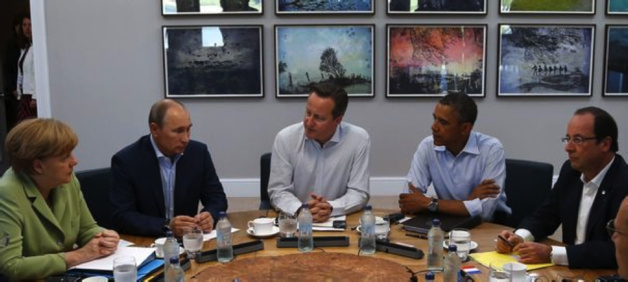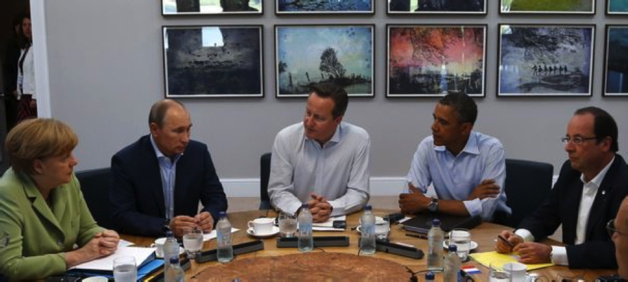
Vladimir Putin during Enniskillen’s G8, in Northern Ireland, in June 2013. In international affairs, Russia does not accept to play supporting roles anymore. Crédit DR
The country’s industry is devastated and late coming compared to other emerging countries, with a delay that keeps increasing. Indeed, on this matter, economist Yevgeny Yasin, former Minister for the Economy said : “It is an illusion to compare Russia to China, to India or even to Brazil, because our industry needs to be rebuilt.” The issue regarding the network of roads illustrates this situation. Whereas China builds 40.000 additional km (24854 mi) of road every year, Russia makes do with a small thousand. Economists say that this situation is due to the fact that one kilometre of road is three times more expensive than in Europe. This allows us to raise another issue with which Russia is confronted, that is, corruption. Thus, the country ranks 146th out of 180 countries according to the ranking established by the NGO Transparency International with regard to the perception of corruption. Elena Panfilova estimates that corruption causes the budget to lose between $200 and $400 billion every year. Most of this money goes back to the people who worked on the contracts linked to natural resources and the anti-crisis projects.
Gas and oil exportations (60% of Russian exportations) hide this industrial poverty. We can therefore fear devastating effects in the future. This over-use of resources does not lead to enough diversification of the production structure, and most of all of the exportation structure. The country is often described as a rentier state, in other words it holds important assets which generate income. The risk is to fall in the so-called “Dutch disease”. This term describes the whole of the mechanisms through which a strong allocation of natural resources can negatively influence growth in the long run. This term appeared in The Economist to explain the stagnation of the activity in the Netherlands in the 1960s. This stagnation can be explained by the result of a large deposit of natural gas. The exploitation of this resource generates profits, which incites the country to develop the activity to the detriment of the other sectors. Inflation thus occurs following the growth of the national income and of demand. In the meantime, the influx of capital leads to a commercial surplus and an appreciation of the actual exchange rate. As a consequence, the competitiveness of the other exporter companies declines. Their profits decrease, which reinforces the idea of developing the extracting activity. However, these agents’ strategy shows limits in the long run. Indeed, once the natural resources are depleted, the fact that the other sectors of the economy have not been sufficiently developed and the overestimation of the exchange rate lead to a lasting stagnation of the economy.
Russia’s challenges
Russia has to reach autonomous development by modernising its industrial fabric from the benefits provided by the gas and oil exportations. In this aim, it has to encourage foreign countries to invest. Here again the internal problems of the country can slow down investors. Indeed, it is the political and institutional stability of countries which encourage investors who are therefore reassured by a favourable business environment. What seems even more difficult today with the sanctions imposed by Europe and the United States since Crimea’s annexation is that Russia must give a strong and open image by realising market-friendly reforms, that is to say centred on the market. The creation of free zones with tax benefits can allow a country to be more attractive. Some signs follow this statement, such as the creation of a Russian Silicon Valley, which would welcome research laboratories of foreign and Russian firms, as well as business incubators and top-ranking universities. Nevertheless, much criticism can be made with regards to this project. Dominique Fache explains that the project comes from too superficial and quick a reflexion. Dimitri Zimine adds that this modernisation should apply to the political field too.
Even Bulat Stoliarov from the Insitute for Regional Policy of Moscow admits that the government is “endowed with an idle administration”. This critic refers to the incapacity of the country to save the four hundred single-industry cities. Concerning this inheritance, estimated to be cumbersome, of the soviet planning and yet provider of millions of jobs, a disillusioned Stoliarov explains that they must die away. All the more so as, since the liberalisation of electricity and the telecoms, the country records net capital inflows whereas under Yeltsin we observed capital flights.
Thus, Russia is headed in the right direction in order to become a future great power, but the problems linked to the mafia still repel the investors. This is why it is necessary to avoid hurting foreign companies willing to establish themselves in Putin’s nation, through a liberalisation of the market. We can thus question ourselves on Russia’s current strategy, consisting in maintaining a permanent confrontation with Europe and the United States. Economically speaking, these quarrels have a disastrous impact. Indeed, within a few days importations from Russia have decreased and the rouble has tremendously lost of its value because of the companies’ loss of confidence.




























